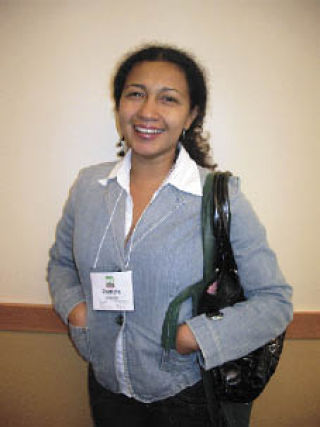ARLINGTON — Patricia Lovejoy and her husband, Mark, grow organic vegetables at Garden Treasures in the Stillaguamish Valley, and Patricia encouraged members of the Arlington Garden Club recently to use green gardening methods at a recent garden club meeting.
“Grow green and buy local” was the message Lovejoy delivered to more than 50 club members at its November meeting.
The Lovejoys grow a wide variety of vegetables using only organic methods.
This means using no man-made chemicals, fertilizers or pesticides, Lovejoy said, but instead using a number of basic organic gardening techniques.
First among these is to weed and mulch early in the spring.
She promised that the time spent removing weeds in the early spring will result in much time saved later in the year.
“Taking time to mulch will also greatly decrease future weeding and help keep the soil moist and loamy,” Lovejoy said.
At Garden Treasures, they mulch with organically grown straw from a neighboring farm.
Another basic, even for small gardens, is crop rotation to reduce diseases and depletion of soil nutrients, Lovejoy said.
Gardeners should keep track of where each type of vegetable was planted, and plant that vegetable in a different section of the garden the following year. Often overlooked in small gardens is to plant cover-crops in the off season. Legumes, in particular, are great for replacing nutrients in the soil.
Sow a cover-crop in late fall, and then two to three weeks before you want to start planting in the spring, chop up the cover crop and turn it over in the soil. For a small garden this can be done with just a hoe or shovel. A tiller or tractor would be needed for larger gardens.
Repeat the tilling process again just before planting.
To stretch out short growing season, Patricia suggesting using Reemay, a lightweight fabric-like material, to lay over plant rows.
“This serves as a mini-greenhouse, increasing warmth and discouraging bugs from laying eggs near the plants,” Lovejoy said. With care, Reemay can be used several times.
A relatively new product that the Lovejoys hope to have available by spring is odorless chicken manure pellets. Long recognized as very good and inexpensive fertilizer, removing the odor should also remove the major barrier to its widespread use.
In keeping with their goal of buying and selling locally, Garden Treasures obtains at least 90 percent of their seedlings from local farms. This means very limited resources spent on shipping, and enables them to ensure the products they are receiving are indeed grown or developed organically.
The same is true for consumers. Whether one grows organic produce themselves, or purchases from local farmers such as Garden Treasures, the amount of petroleum products used for shipping is greatly reduced, the food is free of man-made chemicals, and buying products locally keeps the tax dollars in the community.
Garden Treasures is winding down its growing season for the year, but will be selling landscaping plants, trees and shrubs, as well carefully groomed Christmas trees until Dec. 20 when they close for the season. Re-opening is scheduled for Feb. 15, 2009.
Garden Treasures is a nursery and certified organic farm. For more information, call 360-435-9272, or go online to www.arlingtontreasures.com.








